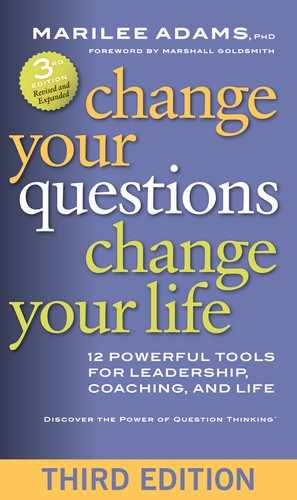Tool 1: Empower Your Observer
Purpose: To cultivate the ability to be still, calm, and present with ourselves and others. This capacity is the foundation of equanimity that helps us to become more present, centered, resourceful, and strategic. The observer self is also the basis for self-reflection and the ability to engage in intentional change.
Discussion: In Chapter 2, Ben begins learning how to stand outside himself and nonjudgmentally witness his thoughts, feelings, and actions. Joseph explains that we all have this observer capacity. It is sometimes experienced as a feeling of watching a movie in which we are one of the actors, or simply witnessing our own actions from a great distance. The more we develop our observer capacity, the more in charge we can be of our thoughts, feelings, and actions— and the less likely we are to be controlled by people and circumstances outside ourselves.
From the position of observer, we gain the ability to simply notice what is, somewhat detached from our own thoughts and feelings. We become more able to distinguish between our perceptions and opinions and what’s actually happening around us. It is a way of being more “mindful” of the role our own emotions, opinions, or attachments play in how we view the world. Many spiritual and philosophical traditions recognize this observer capacity as a natural ability that is strengthened by practices such as meditation or the ones described here.
Is it ever possible to become 100 percent objective and open to what’s true and real? Of course not. But switching into observer mode, to any degree, is an invaluable skill for negotiating change, making decisions, operating effectively under pressure, and relating well to others. From the observer self we are in an ideal position to recognize the kinds of questions we’re asking and to switch to Learner questions when we find ourselves on the Judger path.
Here are three simple ways to empower your observer capacity.
Practice 1: The next time your phone rings at home or at work, stay still and just let it ring. In fact, listen to the ringing. As you do, observe your reaction to the ringing, such as your desire to act by rushing to the phone and picking it up or checking the caller ID. Carefully observe what’s going through your mind and body, without taking action (that is, answering the phone) or becoming attached to the thoughts and feelings that are triggered by the ringing phone.
If you wish, imagine that your thoughts and feelings are like clouds moving across the sky, and you’re simply and calmly watching the shifting scene.
Practice 2: When you get into a challenging situation in which you have an impulse to act, or you have thoughts or feelings you want to express, just step into your observer mode instead. Remind yourself that, just as with the ringing phone, you do not have to “answer” those impulses. You can cultivate patience as you learn to simply observe. Then, when you do take action, you will be more thoughtful, strategic, and mindful.
Practice 3: The next time you’re faced with an important choice, or when you notice you’ve been hijacked by Judger, take a few quiet minutes to be alone. Sit quietly, noting whatever you are thinking, feeling, or wanting at that moment. Promise yourself that regardless of what you observe, it is not yet time for action. Simply observe and note.
In the most expansive sense, the observer is calmly asking a single Self-Q: What’s present now? As your observer becomes more refined and skillful, you will become better and better at recognizing when you’re in Judger and at simply accepting that this is momentarily where you are. It is this moment of “waking up,” noting where you are, that grants each of us the liberating power of true choice.
